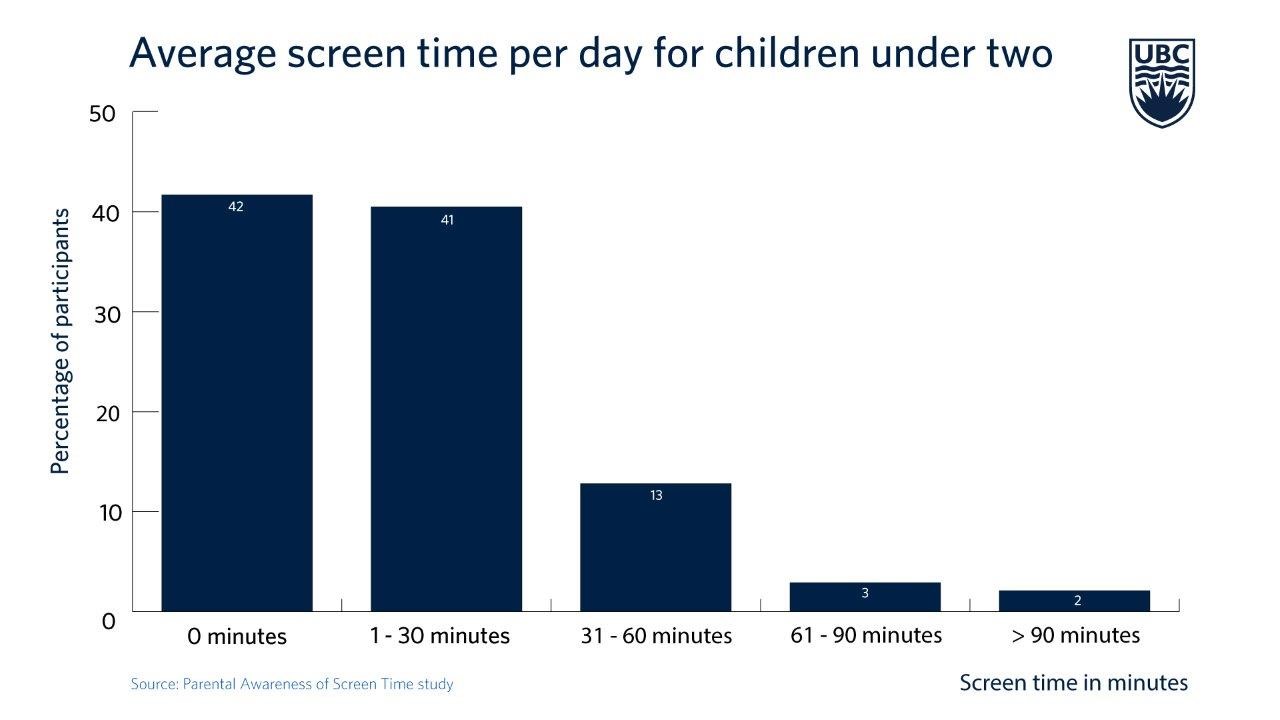New UBC Study on Screen Time for Infants and Toddlers
Photo Credit: Unsplash User Hal Gatewood
A team of nurses, mentored by UBC nursing professor Wendy Hall, surveyed 242 parents who had children who were under two years of age, from six Vancouver public health districts, asking them how much time their children spend in front of screens and looking at the reasons why parents expose their children to electronic media. They also asked the parents about their attitudes about screens to determine whether that had any bearing on how much time the children spent looking at electronics.
The study found that, “while a large proportion (42 per cent) of them said they did not allow their children any screen time, an almost equal amount (40.5 per cent) allowed up to 30 minutes per day, and the remaining 17.5 per cent gave them an hour or more per day”.
Observations in health centre practice had created concerns leading to the study. Reda Wilkes, study co-author and a public health nurse with Vancouver Coastal Health, commented, “ We noticed in our practice that we were seeing a lot of use of screens in younger kids. During vaccination clinics, instead of holding their child and cuddling them when they go pain after a shot, they would be flashing their smartphone in front of them to try and distract them with a video.” She noted that there is no evidence to support the use. “Young kids are supposed to be constantly moving and when you put them in front of the TV, that just stops.”
Wendy Hall pointed out that she was not surprised by the survey results. “It’s unsurprisingly that parents use screens to distract children so they can get chores done and try to balance work and family life. Nevertheless, we need to help parents appreciate that screen time can not only have negative effects on children’s language development, but it also interferes with children getting adequate amounts of sleep, even if the screens are not part of the bedtime routine.” https://news.ubc.ca/2018/02/14/toddlers-getting-screen-time-despite-guidelines-to-the-contrary/
Dr. Hall was interviewed about the study by Global News reporter Jesse Ferreras on February 15, 2018. The study draws on research that has shown screen time for toddlers to be associated with “expressive language delays and irregular sleep schedules” and that children under two years old “learn less from television than from real-life experiences”.
In their November 2017 Position Statement Screen time and young children: Promoting health and development in a digital world, the Canadian Paediatric Society recommendations for parents include:
Minimize screen time:
- Screen time for children younger than 2 years is not recommended.
- For children 2 to 5 years, limit routine or regular screen time to less than 1 hour per day.
- Ensure that sedentary screen time is not a routine part of child care for children younger than 5 years.
- Maintain daily ‘screen-free’ times, especially for family meals and book-sharing.
- Avoid screens for at least 1 hour before bedtime, given the potential for melatonin-suppressing effects.
Mitigate (reduce) the risks associated with screen time:
- Be present and engaged when screens are used and, whenever possible, co-view with children.
- Be aware of content and prioritize educational, age-appropriate and interactive programming.
- Use parenting strategies that teach self-regulation, calming and limit-setting.
As a family, be mindful about the use of screen time:
- Conduct a self-assessment of current screen habits and develop a family media plan for when, how and where screens may (and may not) be used.
- Help children recognize and question advertising messages, stereotyping and other problematic content.
- Remember: too much screen time means lost opportunities for teaching and learning.
- Be reassured that there is no evidence to support introducing technology at an early age.
Adults should model healthy screen use:
- Choose healthy alternatives, such as reading, outdoor play and creative, hands-on activities.
- Turn off their devices at home during family time.
- Turn off screens when not in use and avoid background TV.
The paper also offers a set of questions for family workers to use to ask families about screen use:
Ten Questions to Consider Asking Families With Young Children
- What kind of screens are in your home (e.g., TV, tablet, computer, smartphone)? Which does your child use?
- Is watching TV or programs/movies on other devices a shared family activity and a common way to relax? How often is a screen on in the background although no one is really watching?
- Does anyone in the family use screens during mealtimes?
- What do you watch with your child? What does your child watch alone?
- Do you encourage or discourage conversation with your child while you are using screens?
- Do you ever watch adult/commercial programming with your child?
- Does your child use screens while you do chores around the home? Often? Sometimes?
- Are there any screen-based activities in your child’s day care program? Do you know how much these are used?
- Does your child use any kind of screen before bedtime? How long before bedtime? Is there a TV or computer in your child’s bedroom? Does your child take mobile devices into the bedroom?
- Does your family have rules or guidelines for screen use that everyone understands and shares?
Information for parents is available at www.caringforkids.cps.ca

